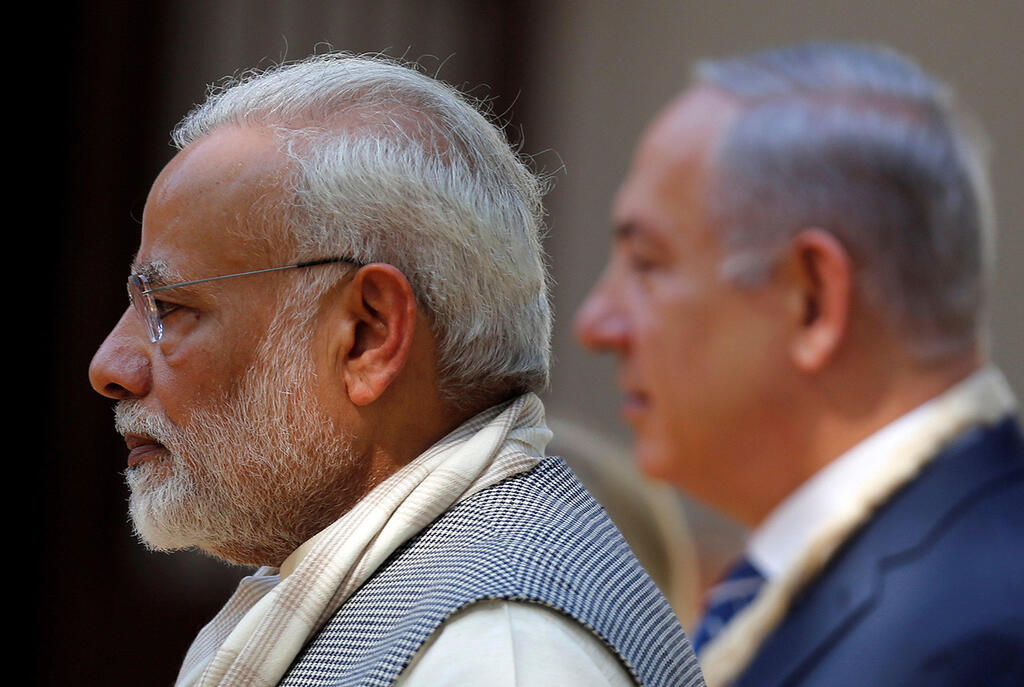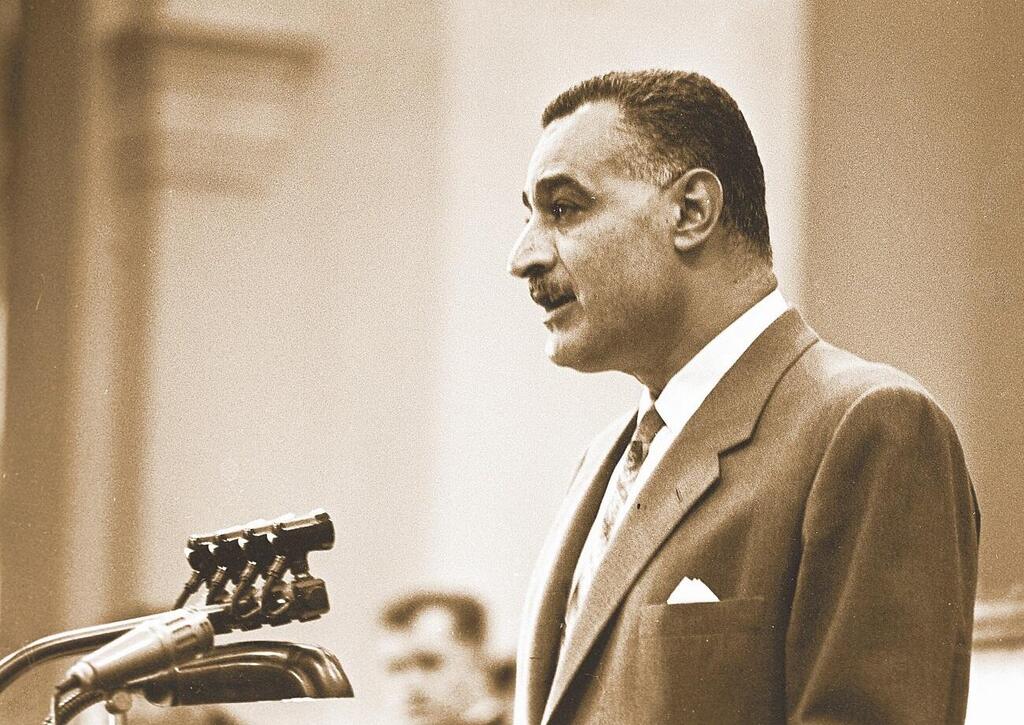Getting your Trinity Audio player ready...
Although cooperation between Israel and India in terms of military agreements and economic trade has become increasingly fruitful in recent years, there was a time when India did not have diplomatic relations with Israel. A situation that ended in 1992, when the two nations made bilateral agreements that became increasingly close, especially due to the mutual need to counter jihadist terrorism.
Although relations between New Delhi and Jerusalem seem to have improved, especially since current Indian Prime Minister Narendra Modi was first elected in 2014, on several occasions India has nevertheless aligned itself with countries that vote against Israel at the United Nations.
4 View gallery


Indian Prime Minister Narendra Modi and Israeli Prime Minister Benjamin Netanyahu
(Photo: Reuters)
To investigate the issue, we spoke with Indian-born British journalist Tufail Ahmad; former editor of the BBC, where he worked for the Urdu Service, he is currently a senior fellow at MEMRI (Middle East Media Research Institute), where he was director of the South Asia Studies Project.
In the last Indian elections, Modi’s BJP party lost the outright majority. How can this affect India’s foreign policy?
"Irrespective of which political party wins elections in New Delhi and Washington DC, India-U.S. relations have largely been on a steady path. India's foreign policy is determined by its national interests, not by which political party wins elections. Prime Minister Narendra Modi heads a center-right government. At the personal level, Prime Minister Modi finds himself close to Benjamin Netanyahu of Israel and his camaraderie with his Israeli counterpart was seen during his 2017 visit to Israel.
"Even though his Bharatiya Janata Party (BJP) lost an outright majority in this year's elections, most opposition parties in India will stand shoulder to shoulder, notwithstanding their criticisms, with Modi on issues involving the West and the Middle East, or much closer home with Pakistan and China.
"With regard to Israel, no matter how cordial Modi shows himself to be with Netanyahu, his government remains deeply conscious of the fact that nearly 9 million Indians are employed in the Arab countries, and any attempt to be seen close to Israel in terms of foreign policies can affect their interests. The Modi government is forced by these considerations to balance in relations with the countries of the Middle East."
What kind of relations there were between India and Israel before October 7?
"There has been no significant change in India's diplomatic stance following the October 7 Hamas attacks in Israel. A number of Western commentators praised Narendra Modi for his strong condemnation of the Hamas attacks and expressions of sympathy and prayers for the Israeli victims. However, most of these commentators miss the point that Modi's statements, especially those shared on social media, are extremely nuanced and originate from his personal handles, not from the official accounts of the prime minister of India.
"In its authentic form, India's foreign policy stance is formally stated by the spokesman of the External Affairs Ministry in New Delhi. At a press conference five days after the October 7 attack, the MEA spokesman Arindam Bagchi did mention it as a 'terrorist attack' but he deflected specific questions from journalists about designating Hamas as a terrorist organization, merely saying that there is 'a global responsibility to fight the menace of terrorism in all its forms and manifestations.'
"In the same press conference, the spokesman advocated India's 'long-standing position' which favors 'the resumption of direct negotiations toward establishing a sovereign, independent and viable State of Palestine living within secure and recognized borders, side by side at peace with Israel.'
"However, India and Israel have developed strong economic and military relations over the past few decades. This trend has been continuing since 1992 when the then Prime Minister Narasimha Rao, at the helm of a center-left Congress government, established full-fledged diplomatic ties with Israel. Israel's contributions, especially in India's agricultural sector, as well as military cooperation, are established by now and can be expected to continue in coming decades, maybe some aspects of it not overtly."
What changed after the Hamas-led massacre and the beginning of the Israel-Hamas war?
"The Hamas attack has certainly put a restraint on India and other countries that were leaning toward Israel. The televised images from Gaza in Indian homes tend to make India's public stance on Israel more complicated than ever. However, no drastic change of stance can be seen in India's foreign policy toward Israel and the Arab world.
"This is especially because Hamas has not been able to garner support from many Islamic countries such as Pakistan, Bangladesh and Afghanistan. In Pakistan, religious leaders from Jamiat Ulema-e-Islam and the Jamaat-e-Islami have expressed support for Hamas, but even the Pakistani military and political rulers find it hard to go beyond lip service. Also, India has been facing Pakistan-aided jihadi terrorism in the Kashmir valley for more than three decades now and is unlikely to approve of Hamas' methods rooted in the global nature of jihadism."
In an article published in 2017 on The Print, you highlighted the fact that despite Narendra Modi appearing close to Israel, India still voted against it at the UN. How do you explain this contradiction?
"Having undergone centuries of foreign rule, firstly under the Mughal rulers who settled here forever, and secondly under the British colonial rulers who plundered India's natural resources, India has yet to come out of the intellectual subjugation it went through the extended periods of the non-indigenous corpus of intellectual and cultural ideas.
"After the British rulers left in 1947, the government headed by the first Prime Minister Jawaharlal Nehru adopted a foreign policy which in principle was aimed at not aligning with the West or the Soviet Union, the two rival power blocks, but still tilted toward the Soviet-led communist alliance. During the Cold War period, India's foreign policy came to be known as Non-Alignment and was also expressed in the Non-Alignment Movement steered by Jawaharlal Nehru, President Josip Broz Tito of erstwhile Yugoslavia and Egyptian President Gamal Abdel Nasser.
"India's foreign policy is still caught in this lingering archaism, sometimes forging ties with Russia which has been a more reliable friend in the international arena, at other times siding with the U.S. but not yet fully. This diplomatic stance is reflected in India's foreign policy, especially involving Israel, the U.S. and the wider Middle East. In its voting behavior at the United Nations, India, even as a dependable ally of Israel, continues to remain conscious of the millions of Indian workers employed in the Middle Eastern countries and worries that their larger interests can be hurt if it stands by Israel in a more vocal way."
Talking also about Pakistan, in an article you published on MEMRI’s website you spoke about Shi’ite Pakistanis being recruited by Iran. What can you tell us about that? And what role could this topic play in the Israel-Iran conflict?
"In recent decades, Iran has been consistently and regularly recruiting Shi'ites from Pakistan to fight as part of the Zainabiyoun Brigade and from Afghanistan into the Fatemiyoun Brigade. In the decade after the 1979 Islamic Revolution, Iran sponsored and financed some Shi'ite terror groups in Pakistan which led to Sunni-Shi'ite riots in Pakistani society. But it appears that such policy has been limited in recent years.
"However, Iran has instead resorted to recruiting Pakistani Shi'ites as part of the Zainabiyoun Brigade to fight in Syria and elsewhere against the U.S. and its allies. It was also reported in the Pakistani media this year that about 50,000 Shi'ite pilgrims from Pakistan visiting the holy shrines in Iraq and Iran have disappeared. This raises serious concern that most of them, recruited over the past few years, could have joined the pro-Iranian militias in the Middle East. In any likely Iran-Israel conflict, it is certain that these Shi'ite militias will adopt guerilla tactics and fight against Israel.
"A much more likely form of immediate threat to Israel is that Pakistani soldiers could wear Turkish military uniform and fight in a Turkey-led war against Isarel. This model of Turkish-Pakistani cooperation was tested successfully a few years ago when the world's attention was focused on fighting the COVID-19 pandemic. Turkish and Pakistani soldiers worked as part of the armed forces of Azerbaijan in the Nagorno-Karabakh War (September 27-November 10, 2020) against Armenia, which lost territories. It doesn't appear that Pakistani soldiers at the time wore Pakistani military uniform. While the threat to Israel from Iran could come from the Shi'ite militias, the much more serious threat could be from the state of Turkey."
- A previous version of this interview has been published in Italian on August 14, 2024, in Milan-based Jewish magazine Mosaico.




